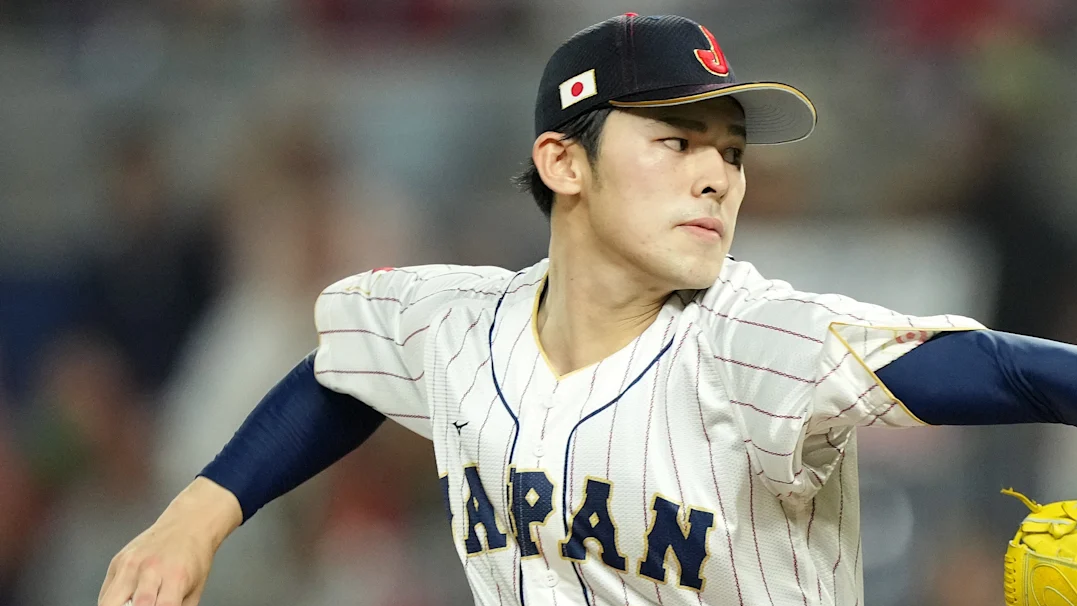
Sasaki, 23, announced his decision to sign with the Dodgers on Instagram Friday. / Eric Espada/Getty Images
I wasn’t in the Los Angeles Dodgers’ meeting with stud Japanese pitcher Roki Sasaki, but let me take a guess as to how it went:
“Hi Roki, we’re the Dodgers. Over the 10 years from 2014 through ’23, we won an average of 99.5 games a season, nine division titles, three pennants and a World Series. Our owner said he considered that to be a failure, so he signed the most talented player in the history of the sport—Shohei Ohtani, your friend and idol—and we immediately won the World Series again last year. We have most of the best players in baseball and we’re willing to spend money to get the rest of them. You can spend your whole career pitching in a six-man rotation to preserve your arm, and we’ll almost certainly find a small mechanical or mental change that unlocks an entirely new level of dominance. The weather is great here, the flight home is a breeze and we sell Hi-Chew at the Dodger Stadium concession stands. Any questions?”
The only surprising aspect of the whole process is that it took him until Jan. 17 to decide.
“I have signed a minor [league] contract with the Los Angeles Dodgers,” Sasaki posted in Japanese on Instagram on Friday evening, according to Instagram’s English translation. “It was a very difficult decision, but I will do my best to make it the right decision when I look back after my baseball career.”
It’s not fair to say that Sasaki, 23, was always going to be a Dodger—rumors that he had illegally agreed a full year ago to terms with the team were persistent enough that MLB investigated and found no evidence of malfeasance, said his agent, Joel Wolfe—but how could he not be?
We don’t know the financial details yet, but they don’t much matter. If Sasaki had waited until age 25 to come to the United States from Nippon Professional Baseball, he would have been eligible for a megadeal perhaps surpassing that of his new teammate and fellow righty Yoshinobu Yamamoto, who signed with the Dodgers last year for 12 years and $325 million. But Sasaki decided he was ready now, meaning he was subject to the rules governing international amateurs and could not top eight figures. Los Angeles’s bonus pool amounts to $5.15 million; even with a few trades for more cash, it won’t be able to offer much more than $8 million and a minor league deal.
“What is important to Roki in making this decision?” Wolfe asked rhetorically in December. “The best I can say is he has paid attention to how teams have done, as far as overall success, both this year and in years past.”
In that case, no other team really stood a chance. Nearly everyone wanted him—a potential ace, at 23, on a minor league deal—but in the end it reportedly came down to three finalists: The Dodgers, the best team in the sport and the best positioned team moving forward; the San Diego Padres, who employ his mentor, righty Yu Darvish; and the Toronto Blue Jays, who also play in the major leagues.
Why would anyone go anywhere other than L.A. at this point?
Right fielder Teoscar Hernández, who spent last season with the Dodgers and the first days of his free agency this fall begging them to take him back, admitted two weeks ago that he’d taken less money to return. “The Dodgers, they’re different,” he said at the press conference announcing his three-year, $66 million deal. “I was gonna do anything in my power to come back.”
Lefty Blake Snell said he did a similar calculus when deciding whether to accept deferred money in his five-year, $182 million deal. “It was really easy,” Snell said at his introductory press conference. “You look at the team, you look at what they’ve built, what they’re doing, it’s just something you want to be a part of.”
This has become a vicious cycle, if you’re an opponent: The team wins, so good players are willing to take reduced salaries or reduced playing time to be there. Then those good players help the team win more. It’s even more true after Ohtani agreed to defer more than 97% of the salary in his 10-year, $700 million deal in order to help the team sign more talent. His contract essentially offers the Dodgers a credit card.
Of course, for Sasaki it wasn’t really about the money. It was about playing for the best team. He would’ve been nuts to go anywhere else. He’ll miss out on the windfall. He hopes to make up for that in wins in the fall.



